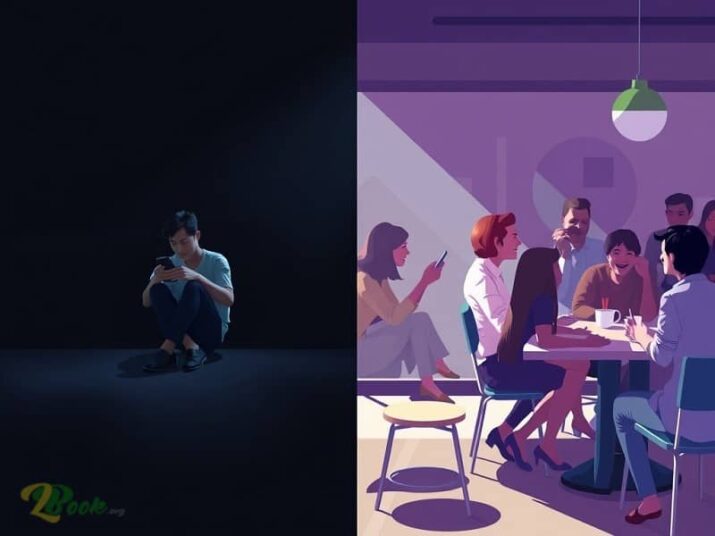Humanity in the Age of Technology: Separation or Connection?
Humanity in the Age of Technology: Separation or Connection?
Introduction
In today’s world, we find ourselves at the crossroads of unprecedented technological advancement. The rapid evolution of technology has transformed our daily lives, fundamentally altering the way we communicate, work, and interact with one another. This essay explores how technology impacts humanity, weighing its benefits against the potential risks it poses to individual identity and social connections.

The Double-Edged Sword of Technology
The Benefits of Technology
Technology has brought about remarkable changes that enhance our lives in numerous ways. Here are some key benefits:
Improved Communication
One of the most significant advantages of technology is the ability to communicate instantly across vast distances. Social media platforms, messaging apps, and video calls have made it easier for people to stay connected, bridging geographical gaps.
Access to Information
The internet has democratized access to information. Individuals can learn about diverse topics, cultures, and perspectives, fostering a more informed society. Online education platforms enable anyone with an internet connection to acquire new skills and knowledge.
Increased Efficiency
In the workplace, technology has revolutionized processes, increasing productivity and efficiency. Automation and artificial intelligence streamline operations, allowing employees to focus on more creative and strategic tasks.
Enhancements in Healthcare
Advances in medical technology have improved patient care and treatment outcomes. Telemedicine, wearables, and health apps enable better monitoring and management of health conditions.
Global Collaboration
Technology facilitates collaboration across borders, allowing teams from different countries to work together seamlessly. This interconnectedness fosters innovation and diverse perspectives.
The Risks of Technology
While the benefits are substantial, we cannot ignore the inherent risks that technology poses to humanity:
Social Isolation
Despite enhanced communication tools, many individuals experience feelings of loneliness and isolation. The quality of virtual interactions often lacks the depth of face-to-face relationships, leading to superficial connections.
Mental Health Challenges
The pervasive use of social media can contribute to mental health issues such as anxiety and depression. The pressure to present a perfect image online can lead to feelings of inadequacy and low self-esteem among users.
Information Overload
The vast amount of information available online can be overwhelming. The constant influx of news and data can lead to confusion and difficulty in discerning credible sources, fostering misinformation.
Privacy Concerns
With the rise of digital surveillance and data collection, individuals face significant privacy risks. Personal information is often harvested without consent, leading to potential misuse and exploitation.
Job Displacement
As automation and artificial intelligence continue to evolve, many traditional jobs are at risk of being replaced. This shift can lead to economic instability and increased unemployment rates.
The Impact of Technology on Human Relationships
Transforming Social Interactions
Technology has transformed the nature of human relationships. While it enables us to connect with others, it also challenges traditional forms of interaction:
Changing Communication Styles
Texting and instant messaging have replaced many face-to-face conversations, altering how we express ourselves. The lack of non-verbal cues can lead to misunderstandings and misinterpretations.
Virtual Communities
Online forums and social media groups allow people with shared interests to connect, fostering a sense of belonging. However, these virtual communities can sometimes become echo chambers, reinforcing existing beliefs while isolating individuals from differing viewpoints.
Impact on Romantic Relationships
Dating apps and online platforms have revolutionized how people find romantic partners. While they offer more options, they can also lead to a “paradox of choice,” where individuals struggle to make commitments due to overwhelming options.
The Generational Divide
Different generations experience technology in varying ways, leading to a divide in how they perceive its impact:
Digital Natives vs. Digital Immigrants
Younger generations, often referred to as digital natives, have grown up with technology and are more adept at navigating online spaces. In contrast, older generations may struggle to adapt, leading to misunderstandings and generational tensions.
Evolving Family Dynamics
Technology has changed family interactions, with many families engaging in parallel play—each member absorbed in their own devices rather than engaging with one another. This shift can diminish the quality of family relationships.
Shifting Social Norms
The prevalence of online communication has altered social norms regarding etiquette and behavior. What was once considered rude, such as texting during meals, is now often accepted as normal.
The Role of Technology in Personal Identity
Shaping Self-Perception
Technology plays a crucial role in shaping how individuals perceive themselves and their identities:
Online Personas
Many people curate their online personas to project a specific image, often idealized and filtered. This can lead to a disconnection between one’s real self and the persona presented online.
Influence of Social Media
Social media platforms often promote unrealistic standards of beauty, success, and lifestyle. The constant comparison to others can lead to dissatisfaction with one’s life and self-image.
The Impact of Cyberbullying
The anonymity of the internet can lead to negative interactions, such as cyberbullying, which can have devastating effects on self-esteem and mental health.

The Quest for Authenticity
In a technology-driven world, individuals grapple with the challenge of maintaining authenticity:
Balancing Online and Offline Identities
Striking a balance between online representation and real-life authenticity is crucial for mental well-being. Individuals must navigate the pressures to conform to online norms while staying true to their values.
The Importance of Genuine Connections
Fostering authentic relationships, whether online or offline, is essential for emotional health. Engaging in meaningful conversations and building trust can help combat feelings of isolation.
Redefining Success
Technology influences how success is defined and perceived. Online achievements, such as followers or likes, can overshadow personal accomplishments, leading to a distorted view of self-worth.
The Future of Humanity and Technology
Embracing Technological Advancements
As we move forward, embracing technology’s potential while being mindful of its risks is vital:
Promoting Digital Literacy
Educating individuals about digital literacy can empower them to navigate the online world effectively. Understanding how to discern credible information and engage positively on social media is crucial.
Encouraging Healthy Boundaries
Establishing healthy boundaries around technology use can mitigate its negative effects. This includes setting limits on screen time, prioritizing face-to-face interactions, and being mindful of the content consumed online.
Innovating for Good
Technology should be harnessed to address societal challenges, such as climate change and inequality. Innovative solutions can lead to a more sustainable future, benefiting humanity as a whole.
Fostering Meaningful Connections
To harness technology’s benefits while minimizing its drawbacks, we must prioritize meaningful connections:
Cultivating Empathy
Encouraging empathy and understanding in both online and offline interactions can enhance relationships. Taking the time to listen and engage genuinely can foster deeper connections.
Creating Safe Spaces
Online platforms should strive to create safe spaces for dialogue, where individuals can express themselves freely without fear of judgment. This can help bridge the gap between differing viewpoints and promote understanding.
Supporting Mental Health Initiatives
Initiatives aimed at supporting mental health in the digital age are essential. Providing resources and creating awareness about the impact of technology on mental well-being can foster healthier online environments.
The Role of Technology in Education
Revolutionizing Learning
Technology has transformed education, providing diverse learning opportunities through online courses and virtual classrooms. This democratization of education allows individuals to learn at their own pace and access resources previously unavailable.
Challenges in Online Education
While online education offers flexibility, it also presents challenges, such as the lack of personal interaction and potential distractions at home. Balancing online and offline learning experiences is crucial for effective education.
Lifelong Learning
The rapid pace of technological advancement necessitates continuous learning. Emphasizing lifelong learning can help individuals adapt to changing job markets and evolving technologies.
The Ethical Implications of Technology
Responsible Use of Technology
As technology advances, ethical considerations become increasingly important. Individuals and organizations must prioritize responsible usage, ensuring that technology serves the greater good.
The Digital Divide
Access to technology is not equal, leading to a digital divide that exacerbates existing inequalities. Addressing this gap is essential to ensure that everyone benefits from technological advancements.
The Future of Work
The rise of automation and artificial intelligence raises questions about the future of work. Preparing the workforce for these changes through education and retraining will be vital for economic stability.
Recommendations for a Balanced Technological Future
Encourage Digital Literacy Programs
Educational institutions and community organizations should implement digital literacy programs that teach individuals how to navigate online spaces responsibly, verify sources, and engage in healthy online interactions.
Promote Mental Health Awareness
Mental health awareness campaigns should be integrated into schools and workplaces to educate individuals about the potential impacts of technology on mental health and provide resources for support.
Foster Interpersonal Connections
Encouraging activities that promote face-to-face interactions, such as community events and family gatherings, can help counteract the isolating effects of technology.
Advocate for Ethical Technology Use
Individuals and organizations must advocate for ethical practices in technology development and usage, ensuring that advancements prioritize user privacy, security, and well-being.
Support Inclusivity in Technology Access
Efforts should be made to bridge the digital divide by providing access to technology and training to underserved communities, ensuring that everyone can participate in the digital age.

Conclusion
In conclusion, the relationship between humanity and technology is complex and multifaceted. While technology offers numerous advantages that can enhance our lives, it also presents challenges that can lead to isolation and mental health concerns. As we navigate this technological landscape, it is essential to find a balance between embracing innovation and nurturing authentic connections.
By fostering digital literacy, promoting empathy, and prioritizing meaningful relationships, we can ensure that technology serves as a tool for connection rather than a source of separation. The future of humanity in the age of technology depends on our ability to adapt and thrive in an increasingly interconnected world.
By addressing the benefits and risks of technology, fostering meaningful connections, and promoting ethical use, we can create a future where technology enriches our lives and strengthens our humanity.
Related Posts
- Lost Humanity: Rediscovering Our Human Essence
- The Power of Your Subconscious Mind Free by Joseph Murphy
- How to Learn to Apologize and Win the Hearts of People?
- Relationships Guides You to a Happy & Successful Life
- What is Happiness and How do You Achieve it?
- NASA Scientists Confirm There is Water on Mars (Video)







